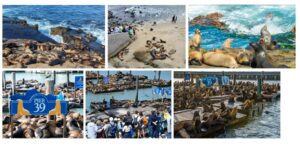It’s hard not to feel conflicted about zoos.
On the one hand, how great is it to get up close to our amazing animal friends, many of which are nearing extinction? The best zoos offer a vital conservation and rehabilitation service, keeping animals safe from poachers and other human/environmental threats.
On the other hand, doesn’t it feel uncomfortable sometimes to see animals jammed into a cramped habitat, gawked at by camera-toting tourists with their runny-nosed kids?
I feel the same way about the seal lions of San Francisco and La Jolla, California. Although not zoos, per se, these two locations are popular “pinniped” hangouts. In SF, the sea lions naturally throng the floating platforms of Pier 39. In La Jolla, they gather just a block from downtown, along the nearby beaches and sea caves.
At both sites, the sea lions are major tourist attractions. But is this a good thing?

Again with the hands.
On the one hand, the sea lions are treated pretty well. At Pier 39, as in La Jolla, it’s illegal to harass wild marine mammals. People need to stay at least 50 feet away. The Pier 39 staff hose down the docks periodically, mostly to freshen the smell of the area. They also monitor sick and injured animals, rescuing them when possible.
All in all, it’s a pretty good deal for the sea lions, who can find plenty of food in the bay and ocean, and avoid predators like white sharks and orcas, which don’t typically feed in this area. Also, the docks are easier to haul out on and more comfortable than a rocky beach. As the tide goes in and out, the floating docks move up and down on the water – a much more comfortable sleeping place than ordinary rocks that get flooded with the high tide.
In La Jolla, the area is a natural landing place for a sea lion colony, with gentle waters and sandy beaches with boulders and rock terraces to snooze upon. The surrounding cliffs offer shelter, especially during birthing season.
On the other hand, are the locals happy about it? It depends. There’s no denying the dramatic rise of tourism since the sea lions descended upon both locations. There is, however, the issue of the smell…especially in La Jolla, where the sea lions gather so close to town.
Besides their natural musk, the sea lions of La Jolla poop constantly. The sun then bakes the feces into the rocks and bluffs to the point where you can smell it from blocks away. Some of the cliffs are also white with bird guano.
One funny story involves the boxer Floyd Mayweather and his entourage, who booked $5,000 worth of rooms at the La Valencia Hotel, overlooking La Jolla Cove. Apparently they left after 15 minutes because of the smell. Mayweather filed suit against the hotel but a judge dismissed it.
For me, both locations are Wow places. Yes, the animals are camera fodder for the tourists. But at least they’re not caged or hemmed in; they can come and go as they like. And for every crass Instagrammer using the sea lions for social media content, there’s a young child viewing a sea mammal up close for the first time and marveling at the wonder of differing species, differing intelligences — cohabiting our planet (at least here) in relative peace.
Smells like a win to me.
(Does proximity build trust and understanding? I think it does. How easy is it to consider another group the enemy when they’re far away and out of sight! This happens all the time in wartime. The far-off enemies are considered evil, bad, lacking in morals or values. They’re “less than human.” And yet, if you’re actually interacting with a group of people (or sea lions0 different from yourself, up close, it’s much harder to objectify them. You look in their eyes and see their humanity. You observe acts of kindness. You discover commonalities. I’m reminded of Daryl Davis, a blues musician who spent 30 years befriending members of the Ku Klux Klan. As friendships blossomed, the Klansmen came to realize that their hate may have been misguided. Over 200 of his Klansmen friends gave up the robes.
Proximity matters. Friendships matter.)
(Dave Blum is the creator of Dr. Clue Treasure Hunts, www.drclue.com, a teambuilding company featuring over 150 treasure hunt locations worldwide. He has visited over 40 countries in his 60+ years of life and plans to keep traveling until he gives up the ghost. Dave lives in Northern California with his wife, Donica, and their 18-year-old Maine Coon, Ava — an indoor cat who dreams of one day escaping captivity and exploring her own neighborhood Wow Places.)
